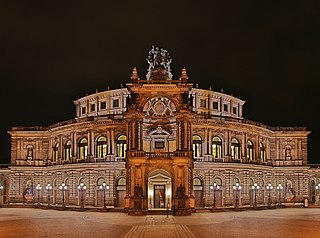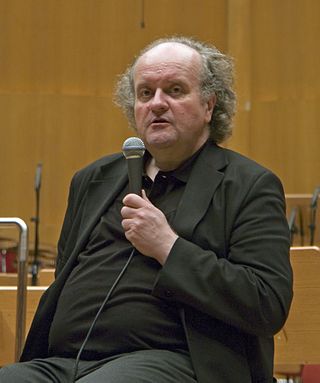
The Sächsische Staatskapelle Dresden, or Saxon State Orchestra Dresden, is one of the oldest orchestras in the world, founded in 1548. It took its present name in 1992, having been known simply as Staatskapelle Dresden during the communist DDR period; a still earlier name was Kurfürstlich-Sächsische und Königlich-Polnische Kapelle, or Electoral Saxon and Royal Polish Orchestra. Created by order of Maurice, Elector of Saxony, it is today a constituent body of the Semper Opera House, along with two choruses and a ballet troupe, where it plays both in the pit for opera and on a platform for its own concert series. It tours regularly and indeed enjoys a strong reputation in symphonic music around the world. Dresden is the capital of Saxony, one of Germany's sixteen states.

Wolfgang Rihm was a German composer of contemporary classical music and an academic teacher based in Karlsruhe. He was an influential post-war European composer, as "one of the most original and independent musical voices" there, composing over 500 works including several operas.
Unsuk Chin is a South Korean composer of contemporary classical music, who is based in Berlin, Germany. Chin was a self-taught pianist from a young age and studied composition at Seoul National University as well as with György Ligeti at the Hochschule für Musik und Theater Hamburg.

The Ernst von Siemens Music Prize is an annual music prize given by the Bayerische Akademie der Schönen Künste on behalf of the Ernst von Siemens Musikstiftung, established in 1972. The foundation was established by Ernst von Siemens (1903–1990) and promotes contemporary music. The prize honors a composer, performer, or musicologist who has made a distinguished contribution to the world of music. In addition to the main prize, other prizes are also given. The total prize money given is currently €3.5 million, with the winner of the main prize receiving €250,000. The prize is sometimes known as "the Nobel Prize of music".
The Handel Prize is an annual award, instituted in 1956, which is presented by the city of Halle, in Germany, in honour of the celebrated Baroque composer George Frideric Handel. It is awarded, "for exceptional artistic, academic or politico-cultural services as far as these are connected with the city of Halle's Handel commemoration". The prize consists of a diploma, a gold and enamel badge, and is presented during the annual Handel Festival, Halle.

Jörg Widmann is a German composer, conductor and clarinetist. In 2023, Widmann was the third most performed living contemporary composer in the world. Formerly a clarinet and composition professor at the University of Music Freiburg, he is composition professor at the Barenboim–Said Akademie. His most important compositions are the concert overture Con brio, the opera Babylon, an oratorio Arche, Viola Concerto, Kantate and the trumpet concerto Towards Paradise. Widmann has written musical tributes to Classical and Romantic composers. He was awarded the Bavarian Maximilian Order for Science and Art in 2018 and the Bach Prize of the Free and Hanseatic City of Hamburg in 2023. He was Gewandhaus Composer of the Gewandhaus Orchester Leipzig and Composer in Residence for the Berlin Philharmonic.

The Berliner Kunstpreis, officially Großer Berliner Kunstpreis, is a prize for the arts by the City of Berlin. It was first awarded in 1948 in several fields of art. Since 1971, it has been awarded by the Academy of Arts on behalf of the Senate of Berlin. Annually one of its six sections, fine arts, architecture, music, literature, performing arts and film and media arts, gives the great prize, endowed with €15,000, whereas the other five sections annually award prizes endowed with €5,000.
The Preis der Europäischen Kirchenmusik is a German music prize awarded annually since 1999 by the Schwäbisch Gmünd Festival Europäische Kirchenmusik. Awards are given to excellent composers and artists for achievements in the field of sacred music. The prize is endowed with €5,000.
The Brahms-Preis has been awarded by the Brahms Society of Schleswig-Holstein since 1988. The prize is furnished with 10,000 euros. It rewards artists who have contributed mesmerizing work for the preservation of the artistic heritage of Johannes Brahms.

Jan Philipp Fürchtegott Reemtsma is a German literary scholar, author, and patron who founded and was the long-term director of the Hamburg Institute for Social Research. Reemtsma lives and works mainly in Hamburg.
The Johannes Brahms Medal of Hamburg is a music award established in 1928, named after the composer Johannes Brahms who was born in Hamburg.
The international Paul Hindemith Prize promotes outstanding contemporary composers within the framework of the Schleswig-Holstein Music Festival (SHMF). The award commemorates the musical pedagogy of Paul Hindemith, who wrote the composition Plöner Musiktag in 1932 on behalf of the Staatliche Bildungsanstalt Plön. The music prize is endowed with €20,000 and goes together with a composition commission. The prize is presented annually by the Hindemith Foundation, the Walter and Käthe Busche Foundation, the Rudolf and Erika Koch Foundation, the Gerhard Trede Foundation, the Franz Wirth Memorial Trust and the Cultural Office of the Free and Hanseatic City of Hamburg since 1990. From 2010 to 2013, the winner was found by a composition competition. The work of the prize winner is to be premiered within the frame of the Schleswig-Holstein Music Festival.
The Bach Medal is awarded by the Lord Mayor of Leipzig during the Bachfest Leipzig in recognition of efforts to promote the work of Johann Sebastian Bach. The Bach Medal of the City of Leipzig is an annual award.
The Robert Schumann Prize for Poetry and Music Mainz is a classical music prize named after Robert Schumann, awarded biennially since 2012. The prize money is €15,000, donated by the Strecker Foundation, Mainz. The prize is awarded by the Akademie der Wissenschaften und der Literatur in Mainz, for "personalities with an outstanding lifetime achievement in the field of poetry and music".
The Robert Schumann Prize of the City of Zwickau is a classical music award. Since 1964 it has been awarded by the Lord Mayor of Zwickau. Robert Schumann was born in Zwickau. Between 1964 and 2002 the prize was awarded annually, since 2003 biennially. The award is given to outstanding singers, instrumentalists and ensembles as well as musicologists and musical institutions, who have rendered special service (sic) to cherishing and presenting Schumann’s musical and literary heritage as well as to the knowledge of his life and works. The prize is endowed with a total of €10,000. The winners receive a certificate and a bronze medal with the portrait of Schumann, created by the sculptor Gerhard Lichtenfeld.
Peter Ludwig Gülke is a German conductor and musicologist.
The Hindemith Prize of the City of Hanau is a music prize given by Hanau, Hesse, Germany and the Hindemith Foundation in Blonay (Switzerland), since 2000. Until 2004 the prize was called Paul Hindemith Prize for Art and Humanity of the City of Hanau in honour and remembrance of the composer Paul Hindemith. The prize consists of a certificate, a medal of honor in silver and €10,000. It is awarded biennially in recognition of outstanding musical achievement.
The Belmont Prize is a music award named after the place of destiny in Shakespeare's The Merchant of Venice. The Munich-based Forberg Schneider Foundation, founded in 1997, promotes outstanding achievements in the field of contemporary music. The biennially-awarded prize is endowed with €20,000 and is one of Europe’s highest endowed awards for artistic creation.
The Telemann Prize is an annual classical music award for special achievements in interpretation, research and cultivation of the life and work of Georg Philipp Telemann.
The Prize of the Christoph and Stephan Kaske Foundation is an annual award for promotion of new music. It was founded in 1988 by Karlheinz and Christiane Kaske in memory of their sons Christoph and Stephan. The Christoph and Stephan Kaske Foundation has its legal seat in Munich. The aim is to promote young, promising interpreters and composers in the field of new music. The award is endowed with € 10,000. The selection of the winner is made by a board of trustees. The prize is awarded in a ceremony at the Künstlerhaus am Lenbachplatz.





